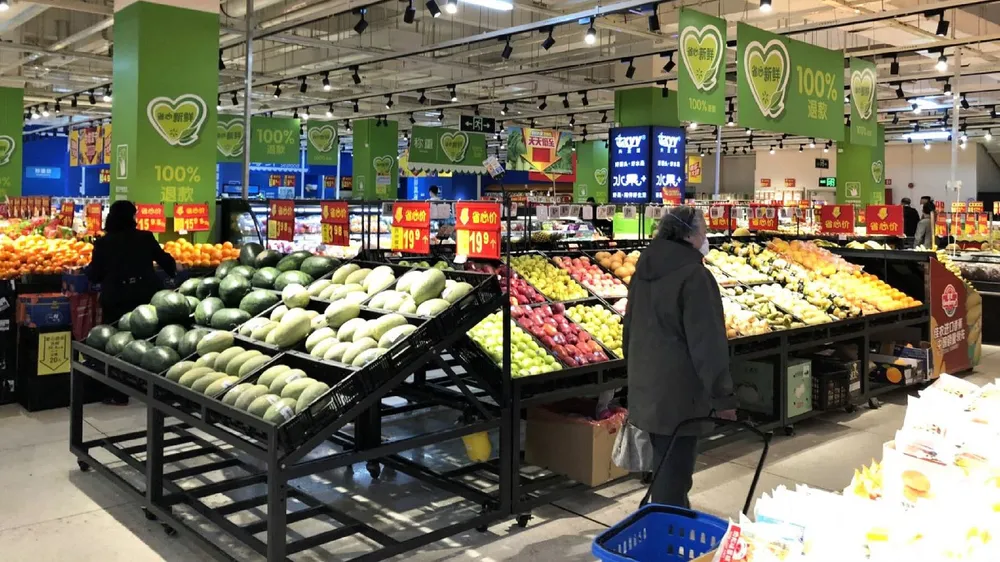
Shopping malls and stores in China have quickly reopened as the government promotes a return to business as usual, only to see consumers stay home and keep their purse strings tight or shop online.
Customer traffic is "less than half of usual levels," said a worker at a Walmart store in a Shanghai suburb late last month. Shelves in the vegetable and meat departments were well-stocked, but few shoppers passed through the aisles during the normally busy late-afternoon hours. Even with its online delivery service, "sales are not growing at all," the source said.
The government has in recent weeks highlighted a brisk recovery in business activity, touting efforts to contain the new coronavirus. Shopping centers and restaurants that had closed to stem the outbreak's spread have rushed to reopen.
Retailers were particularly quick to get back to business in Shanghai, the southern coastal province of Guangdong, and the inland province of Sichuan. In the initial epicenter of Wuhan, Aeon Mall -- a unit of Japanese retail giant Aeon -- is set to reopen all sections of its shopping malls in the Hubei Province capital.
About 80% of restaurants and more than 90% of commercial facilities have resumed business across China, according to the Ministry of Commerce.
But consumers, increasingly wary of government pronouncements and state media, do not feel safe going about their business as usual. Electronics retailer Suning.com says a portion of its brick-and-mortar stores are drawing only around half the usual customer volume. In upscale shopping areas, certain luxury brands show no sign of reopening their shops.
 A Dolce & Gabbana store remains closed in a Shanghai shopping district. (Photo by Naoki Matsuda)
A Dolce & Gabbana store remains closed in a Shanghai shopping district. (Photo by Naoki Matsuda) "I go straight home after work and don't eat out," said a 32-year-old Shanghai resident who continues to order groceries online.
Having lost their jobs or fearing layoffs, people are "in money-saving mode," a retail-industry observer said.
"Even if shoppers come into the store, they won't buy anything unless goods are on sale," said an employee at a Carrefour grocery in downtown Shanghai. Government vouchers are apparently not having the intended effect of opening consumers' wallets.
Hopes of a consumption rebound are also being dashed by a second wave of closings of recently reopened malls, movie theaters, bars and other establishments. Such Shanghai tourist attractions as the Oriental Pearl Tower and the aquarium also reopened in mid-March only to suspend operations again Monday, apparently at the behest of authorities fearing a resurgence of COVID-19 infections.
About 60% of operators of large malls see sales dropping around 30% to 70% on the year for the first quarter of 2020, with virtually no members expecting growth, a survey by the China Chain Store & Franchise Association found. Meanwhile, roughly the same percentage of online retailers see sales holding steady or growing.
Brick-and-mortar establishments faced a harsh business environment even before the coronavirus outbreak. After the SARS epidemic of the early 2000s kick-started online shopping in China, such e-commerce powerhouses as Alibaba Group Holding and Tencent Holdings grew quickly to command power, acquiring supermarkets and department stores.
China's industry of large shopping centers shrank for a third year in 2019, U.K. research firm Euromonitor estimates. Retailers are sure to take a further beating from coronavirus woes.
Meanwhile, e-commerce players spy an opportunity to integrate operations with the brick-and-mortar world -- particularly in fresh foods, the last stronghold of physical stores. Alibaba plans to double its Hema offline supermarket network and open 200 stores this year. Food delivery giant Meituan Dianping decided last month to invest in a fresh-food wholesaler.




















